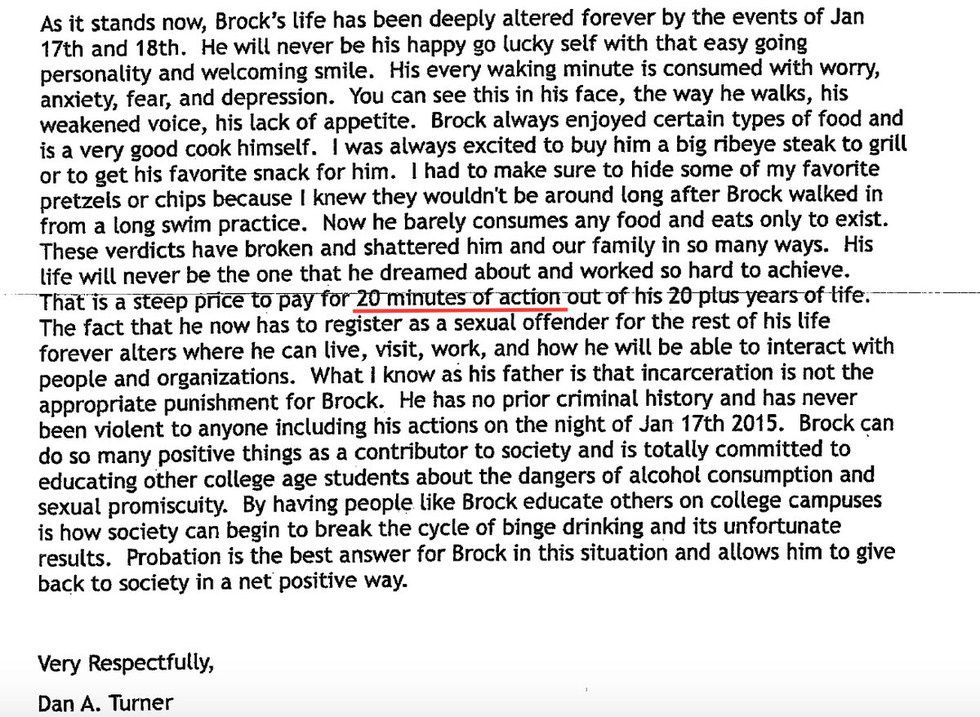Last week, convicted rapist and Stanford student Brock Turner was sentenced to six months in county jail with a three-year probation. Even though Turner originally faced up to 14 years in prison, Judge Aaron Persky gave him this incredibly lenient sentence (six months) fearing that a longer sentence would have a "severe impact" on Turner. In response, the 23-year-old victim released her beautiful, strong twelve-page statement that you can read here.
Unfortunately, her letter was not the only one. Over the weekend, Brock’s father offered a character-witness letter, explaining that Brock’s life has been "deeply altered forever" and that he "will never be his happy go lucky self." His letter perfectly outlines rape culture’s entitled, ignorant and shameful failure to accept rape as a dehumanizing, incriminating act. Turner attempts to abolish Brock’s sentence completely, explaining that Brock, too, was traumatized.
He starts the letter, “I would like to share some memories of my son that demonstrate the quality of his character.” He then goes on to explain how Brock was an academically, athletically and socially gifted child. His father includes tidbits such as, “Brock had a large amount of interest from many Division-1 coaches due to his swimming success” and that, “Stanford was the apple of his eye.” Brock’s father seems to think that his “achievements” such as one, going to Stanford, two, being “talented in athletics,” three, his “ability to understand very complicated subject matter” or four, work ethic excuses him from the charges brought against him. Mr. Turner’s letter proves that he, along with Judge Persky, believes that Brock’s athletic status and achievements relieve him of punishment for his crimes. This is privilege of not only white, heterosexual males but also of college educated students, persons with no prior criminal history and even athletes. The judicial system, media and society seemingly agree that if a person has a “bright future,” the rules simply do not apply.
Read the full letter here.
Luckily, many people have realized that this man’s testimony epitomizes our society’s incredibly prevalent rape culture. This letter fails to place blame where blame is due. Instead of accepting that his son is a rapist, he writes off Brock’s actions as a result of binge drinking and its “unfortunate” results.
As I read this letter over and over, I compared it to the victim’s testimony, wondering what her letter might have looked like if she had adopted the same approach. In some places, the phrasing is, of course, much different, but at times the similarities are striking, requiring a simple pronoun shift. This is how the letter might have changed if someone other than the father of the traumatizer had written it.
“As it stands now, Brock’s life has been deeply altered forever by the events of Jan 17th and 18th”
“As it stands now, her life has been deeply altered forever by the events of Jan 17th and 18th”
“He will never be his happy go lucky self with that easy going personality and welcoming smile”
“She will never be her happy go lucky self with that easy going personality and welcoming smile”
“His every waking minute is consumed with worry, anxiety, fear and depression”
“Her every waking minute is consumed with worry, anxiety, fear and depression”
“These verdicts have broken and shattered him and our family in so many ways”
“These verdicts have broken and shattered her and her family in so many ways”
“That is a steep price to pay for 20 minutes of action”
“There will never been a steep enough price for this 20 minute rape”
“The fact that he now has to register as a sexual offender for the rest of his life forever alters where he can live, visit, work and how he will be able to interact with people and organizations”
“The fact that he now has to register as a sexual offender for the rest of his life is due to the fact that he is a sex offender, a rapist”
“What I know now is that incarceration is not the appropriate punishment for Brock”
“What I know now is that a 6 month incarceration is not the appropriate punishment for Brock”
I am certain that raping an unconscious woman traumatized Brock; it should have. But his “trauma” does not dismiss the fact that he was the one doing the traumatizing. Brock's father's letter perfectly epitomizes the persistent denial of rape culture in privileged communities.





















